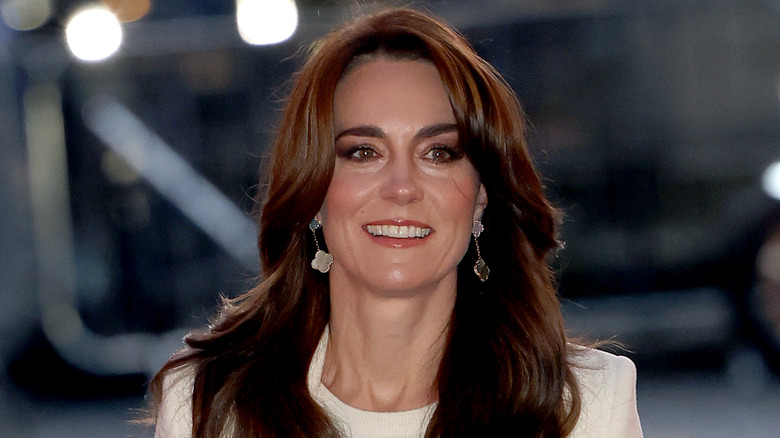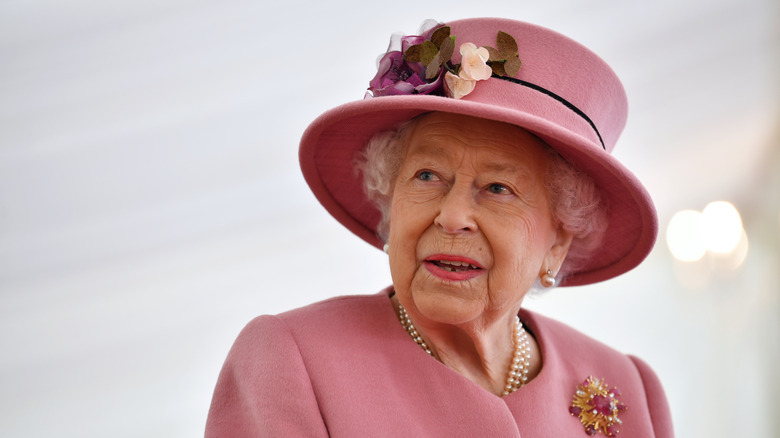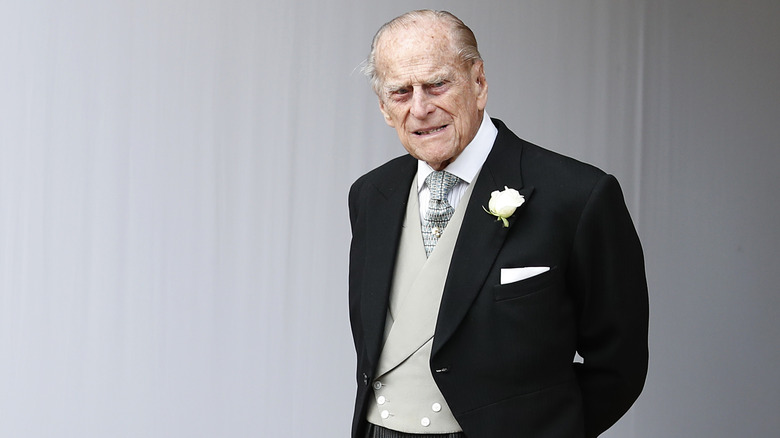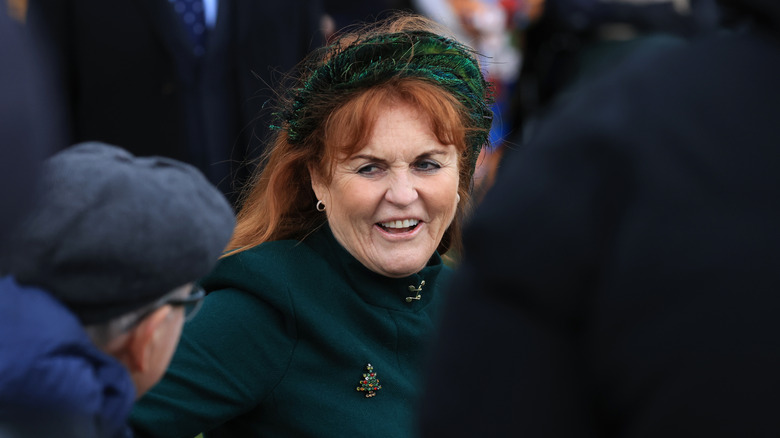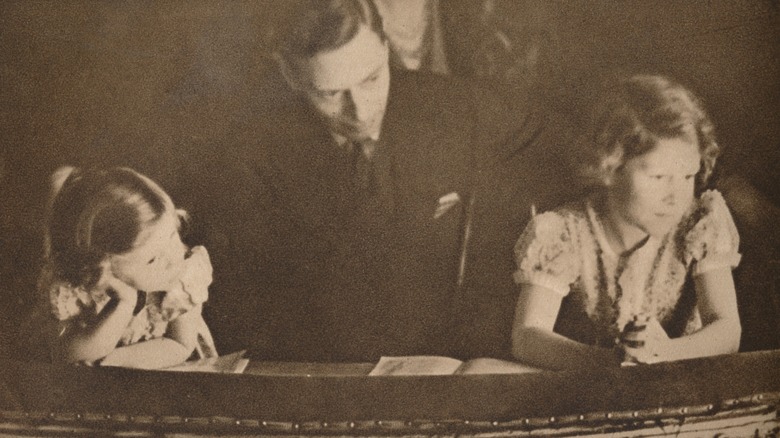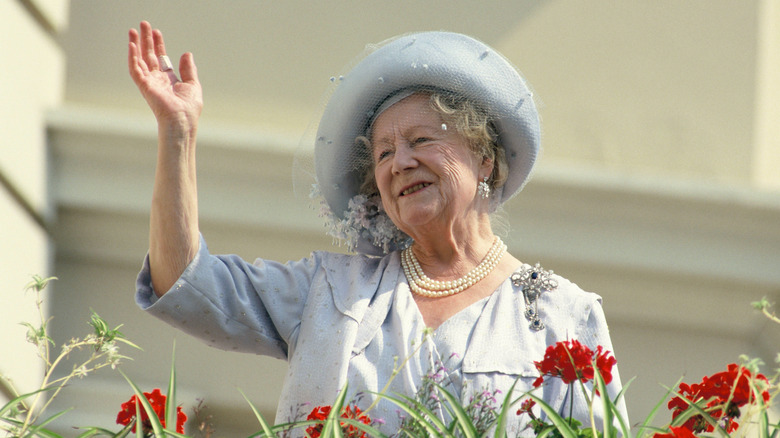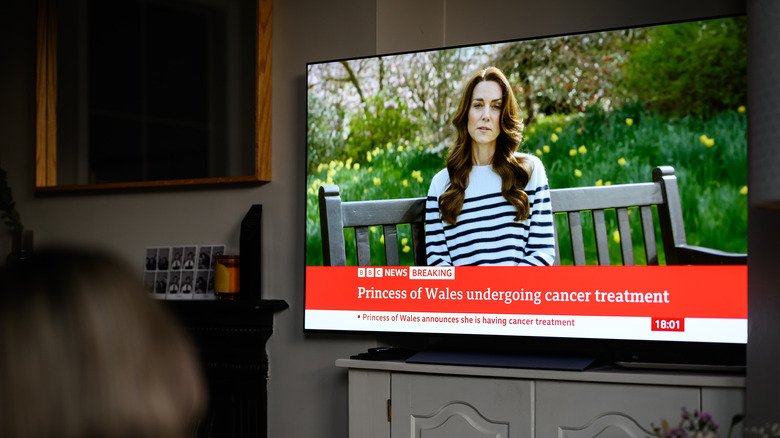The Tragic Truth About The Royal Family's History With Cancer
The Royal family has traditionally been tight-lipped about their personal health issues, often providing murky details about any medical conditions affecting their members. But King Charles III and Catherine, Princess of Wales have broken with this tradition, choosing to offer more transparency regarding matters concerning their wellbeing. In January 2024, early on in his reign, Charles announced his hospitalization for an enlarged prostate. Not long after, it emerged that he had been diagnosed with cancer — and just two months later, Kate Middleton announced her own cancer diagnosis.
Kate shared the news in an Instagram video on March 22, 2024, acknowledging that post-operative tests were positive for cancer after the abdominal surgery she had earlier that year. "This of course came as a huge shock," she said. As for King Charles, a statement issued by Buckingham Palace in February 2024, disclosed tests had also confirmed that King Charles had cancer following his treatment, though it did not name the specific type. "His Majesty has chosen to share his diagnosis to prevent speculation and in the hope it may assist public understanding for all those around the world who are affected by cancer," the statement read.
The Royal Family's history with cancer doesn't begin and end with King Charles III and Catherine, Princess of Wales. There have been numerous instances of its members confronting the disease, including rumors surrounding Charles' mother, the late Queen Elizabeth II, before her passing in 2022.
Queen Elizabeth II reportedly had bone marrow cancer
The circumstances surrounding Queen Elizabeth II's death were intriguing, to say the least. Months before she passed, she notably scaled back her royal engagements due to reported "mobility issues," with many of her responsibilities being transferred to then-Prince Charles. Interestingly, just two days before her death, she was photographed at Balmoral Castle, engaging in her duty by appointing Liz Truss as the new British Prime Minister. The Palace formally announced the queen's death on September 8, 2022, and per the death certificate, she succumbed to her advanced age.
But royal biographer and former member of the British Parliament, Gyles Brandreth, told a different story, writing in his book, "Elizabeth: An Intimate Portrait," that the late royal had dealt with cancer in her final days. "I had heard that the Queen had a form of myeloma — bone marrow cancer — which would explain her tiredness and weight loss and those 'mobility issues' we were often told about during the last year or so of her life," he penned (via Daily Mail).
The Palace never confirmed the veracity of these claims, but Dickie Arbiter, who served as the queen's spokesperson between 1988 and 2000, expressed skepticism. "I don't think anybody knows what it was. The death certificate said 'old age.' I don't think anyone can confirm whether she did or she didn't," he told Newsweek. "It's a conversation that Charles [her son] had with a doctor who said, 'I believe that.' So he didn't know either. We certainly won't know anything for the next 100 years."
Prince Philip was once rumored to have had prostate cancer
Similar to Queen Elizabeth II, Prince Philip's death in April 2021 was officially attributed to his elderliness. But unlike his wife, Prince Philip's health history was far from private, with many of his medical issues and hospitalizations making headlines over the years. In 2012, he was hospitalized due to a bladder infection, and the following year, he spent nearly two weeks at a medical facility following an "exploratory operation" in the abdominal area, a Buckingham Palace spokesperson told CNN. He also underwent hip replacement surgery in 2018, and in 2021, just months before his death, he was reported to have undergone heart surgery.
But all of these didn't seem as grave as the rumors in 2008 suggesting that Prince Philip had been diagnosed with prostate cancer, which stemmed from a news story run by the Evening Standard. At the time, Buckingham Palace acknowledged that while they "have always refused to confirm or deny the persistent rumors that circulate about their health" in an effort to preserve the Royal Family's privacy, they are making a rare exception. "The Duke of Edinburgh has authorized us to confirm that the claim made by the Evening Standard that he has received a 'diagnosis of prostate cancer' is untrue," the statement read. The outlet then rescinded its claims, printing a front-page apology to the Duke of Edinburgh, clarifying that the story was false and he was not suffering from said condition.
The Duchess of York announced that she had skin and breast cancer
Sarah "Fergie" Ferguson, the Duchess of York, is also one of the only royals who has been refreshingly candid about her health. In June 2023, her spokesperson told The Guardian that she had been diagnosed with breast cancer after undergoing a routine mammogram. "She was advised she needed to undergo surgery which has taken place successfully," they noted. "The duchess is receiving the best medical care and her doctors have told her that the prognosis is good."
Instead of being bogged down, Fergie chose to make light of the situation by naming her reconstructed breast Derek. "I'm just coming to terms with my new best friend Derek on my left. He's called Derek. And he's very important because he saved my life," she said in an episode of her "Tea Talks" podcast. "I don't know. It just made me laugh that I have a friend who's with me all the time. Who's protecting me with his shield of armor."
Not even a year after her surgery, yet another health scare emerged. Doctors diagnosed her with skin cancer after examining moles removed during her breast reconstruction. "Clearly, another diagnosis so soon after treatment for breast cancer has been distressing but the Duchess remains in good spirits," her spokesperson shared with AP News. Fergie also took to Instagram to inform everyone that she was doing fine. "Naturally another cancer diagnosis has been a shock but I'm in good spirits and grateful for the many messages of love and support," she wrote.
King George VI was diagnosed with lung cancer
As "The Crown" fans would know, King George VI was in poor health before he died. In 1949, he underwent a lumbar sympathectomy to save his leg, and in 1951, just a year before he died, he received a critical lung operation that necessitated the removal of his left lung.
Though coronary thrombosis was cited as the official cause of death for King George VI, he was diagnosed with lung cancer, a condition stemming from his excessive smoking habits. He was notorious for being a heavy smoker, having reportedly picked up the habit when he was a teenager. He was believed to have smoked up to three packs a day, translating to an estimated 100 pack-years of smoking. This relentless habit led to numerous health complications, leading to his early demise at the age of 56.
"He had died from a coronary thrombosis — a blocking of blood flow to the heart — as a result of a blood clot in an artery — in his sleep. The tea was never drunk: a blood clot had stilled George VI's valiant heart as he slept," the official statement from the palace read (via The Independent). According to renowned surgeon Harold Ellis, the king should serve as a stark reminder that smoking should never be tolerated. "I think George VI should be on every cigarette packet, because he had severe vascular disease in his legs — 99% due to smoking. He had carcinoma of the lung — 99% due to smoking. [And] he died of coronary thrombosis — 90% due to smoking," he said at the Royal College of Surgeons, per The Guardian.
The Queen Mother had multiple cancer diagnoses
Queen Elizabeth, or the Queen Mother, lived a long and seemingly healthy life. The unsuspecting public appeared to believe that she had successfully evaded serious medical complications, but she was later revealed to have been diagnosed with cancer — twice.
In the book "Queen Elizabeth the Queen Mother: The Official Biography," royal biographer William Shawcross interviewed Sir Richard Thompson, the Queen Mother's former physician, who detailed her medical history. It was then revealed that in 1966, she was diagnosed with colon cancer. When the Clarence House announced that she underwent abdominal surgery, what she really had was a procedure to remove a cancerous tumor. However, the book also dispelled the longstanding rumor that the Queen Mother had a colostomy. "But the rumors that the operation had included a colostomy persisted," he wrote (via BBC). "Many people who had to endure that operation themselves derived comfort from the belief that even someone with as active a life as Queen Elizabeth could manage so well after such a difficult procedure."
Shawcross also revealed that in 1984, the Queen Mother was hospitalized to remove a malignant tumor from her breast. William Slack, Sergeant-Surgeon to the Queen, who performed the surgery, confirmed that the operation was successful, with the entire tumor having been excised. The late queen returned home and went on to celebrate her 84th birthday. She reached the age of 101 before passing.
Kate Middleton shared her diagnosis and ended weeks of speculation
The first sign that all was not well with Catherine, Princess of Wales was a January 2024 announcement that she went into the hospital for major abdominal surgery, and would be out of the public eye until after Easter. The lack of specifics meant wild rumors abounded in the following weeks as the world tried to determine exactly why Kate Middleton had disappeared for such a prolonged period.
The speculation ended on March 22, 2024, when Kate took to Instagram to share an official statement regarding the health struggles she faced. "It has been an incredibly tough couple of months for our entire family, but I've had a fantastic medical team who have taken great care of me, for which I am so grateful," Kate said, noting that she and Prince William wanted to make sure their children understood the situation. "In January, I underwent major abdominal surgery in London and at the time, it was thought that my condition was non-cancerous. The surgery was successful. However, tests after the operation found cancer had been present." She added that, on recommendation from her doctors, she was undergoing preventative chemotherapy.
In a heartening show of support, the princess also took a moment to share words of encouragement with others who have been diagnosed with cancer and their families. "At this time, I am also thinking of all those whose lives have been affected by cancer," Middleton said. "For everyone facing this disease, in whatever form, please do not lose faith or hope. You are not alone."

